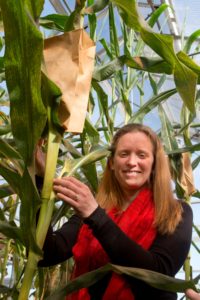 Reading Time: 3 minutes
Reading Time: 3 minutesWritten by Jonathan Eisenthal
Ever wonder what keeps a seed scientist up at night? While they toss and turn, they can’t stop thinking, ‘Will these two promising inbreds cross nicely and become a high-performing hybrid? And when we have a prizewinner, how will it do in different soils? In rainier or drier places?’
There’s a reason it takes years to develop a new corn variety.
Prof. Candy Hirsch will take a group of interested lay people on a one-hour tour through the ins and outs of corn inbreds and hybrids, and how plant genotypes interact with the environment in which they are raised. It’s all part of an event called Classes Without Quizzes, hosted by the University of Minnesota’s (UMN) College of Food, Agricultural and Natural Resource Sciences (CFANS) Alumni Society.
“We can have an individual (corn plant hybrid) with the highest potential, but, depending on how it interacts with the environment, the yield will be quite different,” says Hirsch, the DuPont Young Professor and McKnight Land-Grant Professor in the Department of Agronomy and Plant Genetics.
Whether you use corn to make corn chips or to make feed for animals, this question of how the genotype will react to specific environments is a question that impacts the bottom line. That’s why Hirsch’s research is so important to corn farmers and supported by farmer-led organizations like the Minnesota Corn Growers Association.
Hirsch is one of nine faculty taking part in the UMN CFANS Classes Without Quizzes event on Saturday, April 1, 2017. Adult registration is available up to the day of the event. Registration closes March 25 for the “Kids’ Edition”, a newer offering for ages K-6th grade that focuses on hands on learning. Kids will have an opportunity to learn about maple sugar, animal adaptations, and also make a visit to the Raptor Center.
For the adult learners, Prof. Michael Boland will offer the keynote on ‘The Geography of Food’—where did the foods we savor come from and how did their places of origin mold these tasty victuals. This will be followed by two breakout sessions, where attendees can choose from several class options. In addition to Hirsch’s class, there will be breakout sessions on the future of food security, the life of aquatic plants, the current state of Minnesota’s forests, and a “how to” on raising chickens in your backyard or setting up a hydroponic garden.
This will be the 16th annual Classes Without Quizzes, according to Mary Buschette, director of alumni and constituent relations for CFANS. The first year, the event was for CFANS alumni only; however, CFANS opened the event to a wider audience in year two.
“When we looked at the offerings, we realized that a lot of people are interested in food, and plants, and the environment, so in the second year we offered it to the public,” said Buschette. “The audience is made up of about a third CFANS graduates, a third U of M graduates that aren’t from our college, and then about a third who don’t have an academic connections to the U.”
Also new this year; high school student learners can register for a reduced-price student fee.
“Exposing students to the University Minnesota, its campus, and to give them a test run of the classroom experience, with faculty who are super engaging and interested in interaction—we hope this is an opportunity that lots of high schoolers will take,” says Buschette. “There is a concern about the future of the agricultural work force. We are hoping to spark interest in these career paths.”


